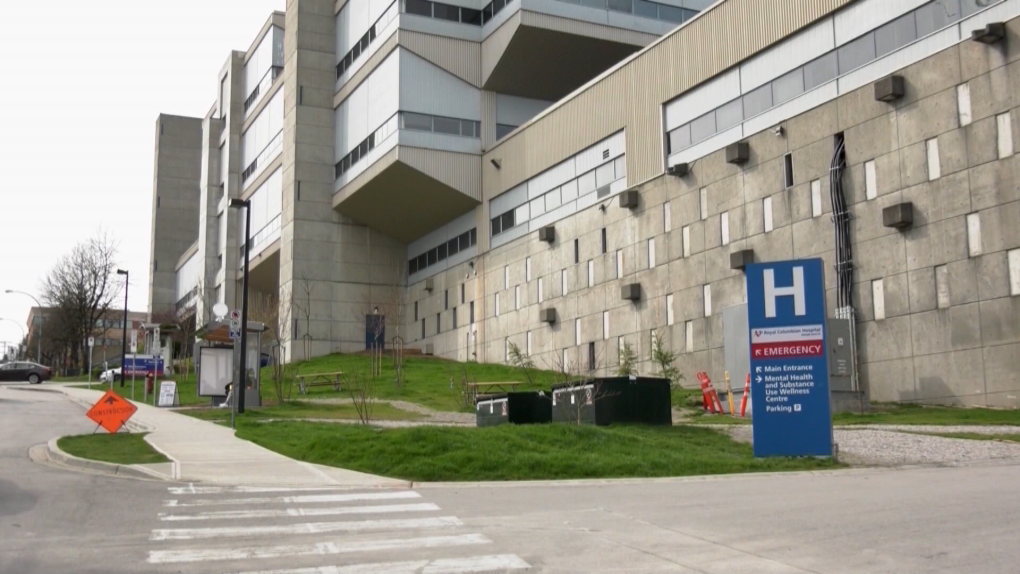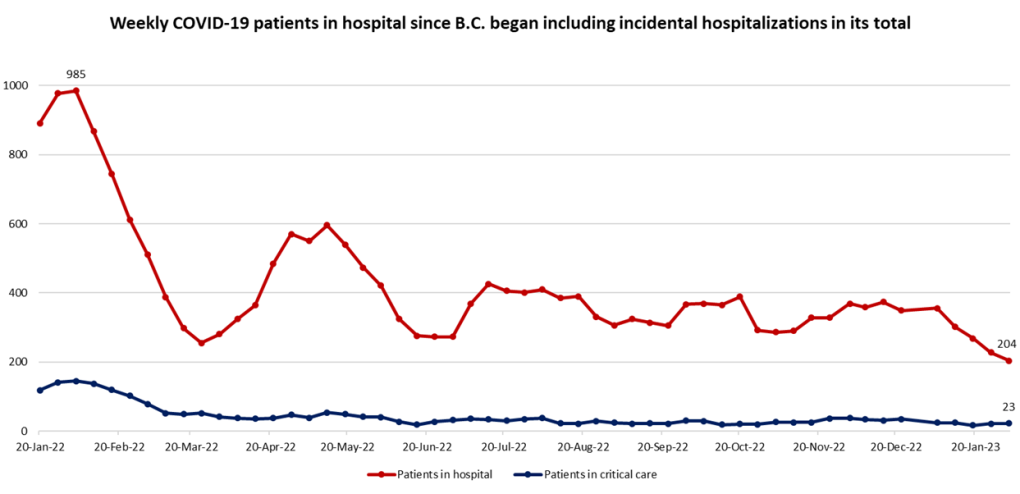Number in hospital with COVID-19 in B.C. hits another new low in latest update

The number of patients with COVID-19 in B.C. hospitals declined again this week, once again reaching a low not seen since before the province began including incidental hospitalizations in its count.
The B.C. Centre for Disease Control reported 204 test-positive patients in hospitals across the province Thursday, down from 228 last week, which was itself the lowest level seen in more than a year.
 The number of people in hospital with COVID-19 in B.C. on Thursdays since the province switched to a "hospital census" model is shown. (CTV)
The number of people in hospital with COVID-19 in B.C. on Thursdays since the province switched to a "hospital census" model is shown. (CTV)
The BCCDC began including incidental cases – meaning those in which a person was admitted to hospital for something other than COVID-19 and tested positive once they got there – in its total in January 2022, near the peak of the first wave of Omicron-variant infections.
The count of hospitalized people on Thursdays peaked at 985 shortly after the switch in reporting methods, but had never fallen below 255 in a weekly update until last week.
Health officials estimate that between 40 and 50 per cent of hospitalizations reported each week are caused by severe cases of COVID-19, while the rest are incidental.
Applying the estimated proportion of non-incidental cases provided by public health officials to the current count suggests roughly 82 to 102 people are currently hospitalized because of the disease.
Tracking the data back to before the switch, the last time the BCCDC reported fewer than 204 people in hospital with the coronavirus was Dec. 28, 2021, when the total was 193.
That total, however, was intended to reflect all patients with severe enough cases of COVID-19 to require hospitalization.
The last time the BCCDC reported a hospitalized population below 100 was in August 2021, before the Omicron variant had been named.
OTHER NEW DATA
Thursday's update from the BCCDC also came with continued declines in new hospital admissions (which are different from the currently hospitalized population) and newly confirmed infections.
There were 293 new, lab-confirmed cases of COVID-19 during the week of Jan. 22 to 28, the most recent "epidemiological week" for which data is available.
That's a substantial decrease – roughly 28 per cent – from the 408 new cases the BCCDC reported last week for the period of Jan. 15 to 21.
Weekly caseloads are not considered representative of the total transmission of COVID-19 in B.C., because they only include the results of lab-based PCR tests, which are available for people with coronavirus symptoms in only a limited number of situations.
Still, though experts estimate that the official case count is off by roughly 100-fold, it has generally moved in the same direction as other indicators like hospitalizations and wastewater surveillance since the province adopted its current, limited testing strategy.
New hospital admissions tell a similar story this week. The BCCDC reported just 73 of them for the week ending Jan. 28, down from 104 initially reported last week for the period ending Jan. 21.
Last week's total has since been revised upwards to 123, and this week's total will be revised upwards in next week's update.
This week's total is beginning at a lower point than last week's did, however, and the revised total for last week is the second-lowest the BCCDC has reported since it switched to weekly data updates in April 2022.
Wastewater surveillance data, which captures a much broader sample of the population than the official case count, had not been updated at the time of writing Thursday.
The most recent wastewater data available on the BCCDC website showed a declining trend in coronavirus concentrations across all treatment plants, though the rate of decline was slowing in some regions.
CTVNews.ca Top Stories

'A step forward': New screening criteria for sperm donors takes effect
Canadians looking to grow their families with the assistance of sperm or egg donations should soon have more options for donors as the federal health agency does away with longstanding restrictions criticized as discriminatory.
What is whooping cough and should Canadians be concerned as Europe declares outbreak?
There is currently a whooping cough epidemic in Europe, with 10 times as many cases compared to the previous two years. While an outbreak has not been declared nationwide in Canada, whooping cough is regularly detected in the country.
Ontario Provincial Police arrest 64 suspects in child sexual exploitation investigation
Ontario Provincial Police say 64 suspects are facing a combined 348 charges in connection with a series of child sexual exploitation investigations that spanned the province.
'Summer of discontent': Federal unions vow to fight new 3-day a week office mandate
Federal unions are launching legal challenges and encouraging public sector workers to file "tens of thousands" of grievances over the new mandate requiring federal workers to return to the office at least three days a week in the fall.
Pfizer agrees to settle more than 10,000 Zantac lawsuits in U.S.: Bloomberg News
Pfizer has agreed to settle more than 10,000 lawsuits about cancer risks related to the now discontinued heartburn drug Zantac, Bloomberg News reported on Wednesday, citing people familiar with the deal.
Watch fighter jet pilots pummel fake enemy ship off coast of Philippines
The United States and Philippines held annual joint-training drills just off the Southeast Asian nation’s western coast on Wednesday. Military forces sunk a 'mock' enemy warship – the BRP Lake Caliraya, which was a decommissioned tanker made in China.
U.S. presidential candidate RFK Jr. had a brain worm, has recovered, campaign says
Independent U.S. presidential candidate Robert F. Kennedy Jr. had a parasite in his head more than a decade ago, but has fully recovered, his campaign said, after the New York Times reported about the ailment.
'Ozempic babies': Reports of surprise pregnancies raise new questions about weight loss drugs
Numerous women have shared stories of 'Ozempic babies' on social media. But the joy some experience in discovering pregnancies may come with anxiety about the unknowns.
Rookie goalie Arturs Silovs to start for Canucks in Game 1 vs. Oilers
Rookie goalie Arturs Silovs will start in net for the Canucks as Vancouver kicks off a second-round series against the Edmonton Oilers Wednesday night.
































